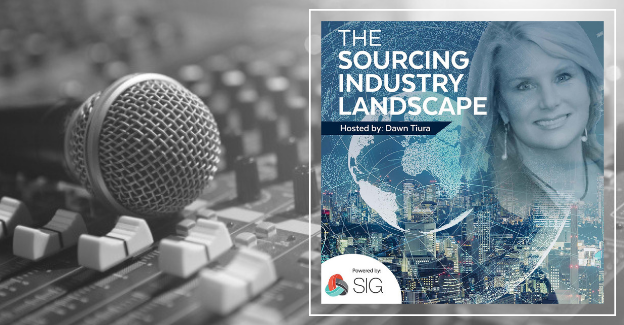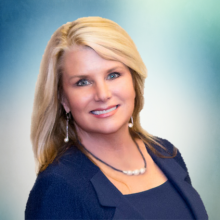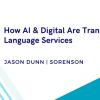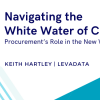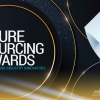Dawn Tiura: Hello, everybody. This is Dawn Tiura from Sourcing Industry Group. Now, today I have the pleasure of talking to Greg Tennyson who has been nominated as a Sourcing Star, and I'm sure nobody is surprised. I don't think there's anyone in sourcing or procurement that hasn't heard of him. But even more so, I don't think there's a procurement leader out there that does not have the utmost respect for Greg. He's been in the industry for about 25 years and I've had the pleasure of watching and learning from him and getting to know him, gosh, for most of that time. So Greg, I want to welcome you to the podcast series.
Greg Tennyson: Dawn, thank you. Thank you for the introduction.
Dawn Tiura: Well, I mean, your contributions are phenomenal. From being, participating on advisory boards for early market entries like Fair Market and Scout RFP and previously with Teal Book and at Wakoopa. Obviously not new to the area—at Rava Solutions and Oracle. I mean, it goes on and on. The number of articles that you've written, the case studies, the podcasts, the presentations, the articles and magazines. I mean, it's been an incredible career. So tell me a little bit about yourself for everybody else that's out there.
Greg Tennyson: Well, I don't know where to begin. You and I have talked in the past. On a very personal level, I've been married for 36 years. My college sweetheart. I've got two grown sons. One is a commercial photographer, the other an attorney for the Department of Justice. I'm a proud father of two and still happily married to my sweetheart.
Dawn Tiura: That's amazing. Your loyalty is phenomenal. I mean, the way you skyrocketed your career through Oracle, and then to go over to VSP and now leading such an amazing team, which is also, folks, had been nominated for one of the team awards for a program called “Spend It Like It's Yours,” a really great group of guys that I just recently got introduced to. So tell me a little bit about leading your team at VSP Global at this point in your career.
Greg Tennyson: I joined VSP in December of 2013 and I was tasked to really look at how we buy goods and services across five lines of business, and the five lines of business operated autonomously. So, we got creative. I was fortunate to hire good talent, the three individuals here in the room with me are a great example of that, but also reached out to our marketing team and we came up with a tagline, “Spend It Like It's Yours,” which morphed into an acronym known as SILIY. We developed a mascot and we really went about changing behaviors at VSP through various effective communication channels, leveraging a drip campaign around video vignettes. Moolah, who's our mascot—and Moolah does exist. It's a 6'6" verbal furry creature. Some of my team has gone to actually get inside Moolah and operate Moolah at all hands meetings, supplier affairs. So, Moolah has become a celebrity on campus. It's not uncommon to have people stop by and take selfies with Moolah.
Dawn Tiura: Oh, I love that. And to get marketing involved in getting your message out, I mean, that's truly unique. I don't know of other sourcing people that have done that. So I mean, had you had this experience at Oracle before or was it a brainchild once you got to VSP?
Greg Tennyson: No, I think it's more in alignment with our culture here at VSP. One of our core values is to have fun. We're a very collaborative culture, and fortunately our chief marketing officer who's now a line of business president is very progressive in how she wants to message to the internal customer, to the internal constituency. So through her support we engaged her marketing team to actually develop Moolah, build Moolah, and create storyboards for the video vignettes, and then engaged our HR team around change management. So it was truly a collaborative affair across all of VSP.
Greg Tennyson: And interesting, I'll pause for a moment Dawn, because SIG played a key role in that evolutionary step that we took at VSP, and that was taking... All of my team went through the Sourcing Industry Group University. So, we put the team through SIG U, and it allowed us to develop a common platform, common terminology, common mindset into how we engage with the business and how we go after adding value, driving the right business outcomes for VSP.
Dawn Tiura: Well thank you for that plug. I appreciate it, but I also love the fact that we are creating a common language around sourcing on a worldwide basis. So I'm so pleased that it's working for you.
Greg Tennyson: Definitely.
Dawn Tiura: So what can I expect next from you, Greg? I mean, you've so much under your belt right now, and—I mean, you could retire tomorrow and we'd still be talking about you for the next 20 years. But what do you think is next for you?
Greg Tennyson: Well, if my team has their way, I will retire tomorrow because they'll push me out to door. What's next?
Dawn Tiura: Yeah, what's next?
Greg Tennyson: I don't know if it's because of my age, VSP, but I believe I have a responsibility to pay it back, to become more of a servant leader. I just was presented with a recent opportunity with an individual—challenge to build his reputation in the space, and partnering with the individual, collaborating with the individual, we're trying to get it done. So he has a recognized name. He's contributing and just help him on his journey. So I see that as my role at this point in my career is to be a servant leader.
Dawn Tiura: I love that. There are so many people that can learn from you and your team that's with you right now, I hope they realize how lucky they already have such a person in their leader. I envy them for the opportunity to learn right at your side.
Greg Tennyson: Well, thank you for reminding them of that, Dawn. I really appreciate it.
Dawn Tiura: I will. Anytime you need my help, Greg, I'll get on the phone and put those guys straight for you. So you just ask. But in the meantime, I want to wish you the best of luck for the award. Folks, we do have a full podcast with Greg Tennyson if you want to get more of his history. It is an absolutely phenomenal story. And so, with that, Greg, I just want to thank you again for being on the podcast and I wish you the best of luck in the awards, and you've got some heavy competition, but obviously you stand out. Good luck.
Greg Tennyson: Thanks, Dawn. Best of luck to you and the SIG team.
Dawn Tiura: Thank you. And everybody, that was Greg Tennyson from VSP Global. He has been nominated as one of the Sourcing Stars for the Future of Sourcing Awards at Sourcing Industry Group. And we'll be presenting the awards this fall.
Dawn Tiura: Hello everybody. Welcome back to the Art of Procurement podcast series. My name is Dawn Tiura. I'm President and CEO of Sourcing Industry Group, also known as SIG. And what I'm really excited about today is I'm going to be interviewing one of our Sourcing Star finalists from our Future of Sourcing Awards program. And with me today is Tim Hopper. Tim Hopper is with Microsoft and I have to tell you, he raced to the finish to be one of our finalists. He has such a glowing recommendation and he so deserves to be in the finalist category. So Tim, I want to welcome you to Art of Procurement.
Tim Hopper: Thanks, Dawn.
Dawn Tiura: So Tim, what is your current title at Microsoft?
Tim Hopper: I'm the responsible sourcing manager for our indirect supply chain.
Dawn Tiura: Okay. And so, this is about you as a finalist, and I have to say you just had a glowing recommendation. So talk to me about some of your innovations and your personal accomplishments.
Tim Hopper: Sure. When I think of the key things I'm most proud of, actually, over the last few years—well, four years at Microsoft. It's really connecting disparate industry topics and bringing them together. And probably one of the biggest ones is the work we've done to really leverage work that's been done with investors, as well as purchasers. So in my space, in sustainability, when we look at change from the business world, there's really two large economic signals. There's the largest signal, which is the investors. Where do people put their money with their investment dollars? And that drives the economy, that makes social as well as environmental impacts with those choices. Purchasers are second. We're the second largest signal to the economy of professional purchasers in the way of public and private purchasers.
Tim Hopper: And so, really looking to see how money moves and broadly within the environment. All social and governance frameworks have been developed in the investor community. Leveraging those and applying those in the procurement contact has been a big innovation that we've done. And I'm proud of some of the work we've done in that space, both on climate change, working with social enterprises, with social impact investors, and most recently working with the ESG or Environmental Social and Governance rating organizations.
Dawn Tiura: That has to make you feel so good, the type of work you're doing, doesn't it?
Tim Hopper: Oh, it's wonderful. I have to pinch myself all the time that I get to work and have the impact that I have. But work within a public company, but it feels like very rewarding nonprofit type of work that I can engage in.
Dawn Tiura: That's neat. So tell me, how did you get into sourcing, and then how did you get into sustainability? Because that's an interesting route. So how did you get into it?
Tim Hopper: Yeah, when I first got out of college I started in the not-for-profit world. Was really interested in that, so I've kind of had that bent that way, initially. From there, went into a public role, more compliance-oriented, and really came in to the tech center. I'm actually dating myself about 20 years now at Microsoft. Started in procurement really and outsourcing, and as we were outsourcing we began to become more global as a company and began to travel and see the impacts that we were having on the world, and much of it positive but not really intentionally or organized. And so, really worked and pushed to establish a role where we would intentionally think about the social and environmental impacts we're having as we source. So I really have whetted my career, not intentionally I guess as I looked ahead, but looking backwards, all those pieces helped align to really position me to do what I'm doing now.
Dawn Tiura: So you bring up a good point. So it wasn't intentionally that you ended up in this area, and yet you're in something that you love. So if you could look back and talk to your younger self, what would you have done differently to either not do or do differently? Or what would you have done maybe purposefully to get you here more quickly?
Tim Hopper: Great question. If I think probably the one thing I would do more quickly, and I want to do more and more even today, is to be more involved in organizations like SIG and other groups. I think that's where I get my best thinking and where I learn about how different industry trends, and try to make the connections that I can make to actually do my work. And having, I guess, that multi stakeholder dialogue in a more structured way where you're actually in the organizations with different missions, learning about those missions and seeing how those missions can be applied is probably the key thing. I think if I would've done that faster… The first three or four years in this role, I was really trying to find my way and come up with a strategy. And I think if I would have been plugged in with more groups, it would have been a much easier path for me.
Dawn Tiura: Do you mind if I quote you? Because that's a great way to describe what you get out of SIG. So I might have to use that line. That was beautifully said. So thank you. So technology, is that impacting you or is it going to impact you in the future as you strive for more sustainability?
Tim Hopper: Definitely. There's some key things that are emerging that's going to be significant. Part of sustainability, there's an adverse as well as a positive effect of sustainability. On the adverse side you're trying to avoid negatives. And so, one thing with emergent technologies, for example around Blockchain will be able to provide purchasers deep assurance on the impact that they're having. And really, if you have a compliance approach program, technologies like that will really help you scale and give you a lot more confidence in what you're purchasing. So definitely see that and some work with AI that we're exploring. So some of those technologies are really going to have a huge impact.
Dawn Tiura: Oh, I like that. I might have to follow up with you about that compliance conversation on Blockchain, because I'm very interested in that. But we don't have a lot of time today. But because it's about you, what's next for you? What can we expect to hear from you, about you in the future?
Tim Hopper: I do love the space I'm in. When I try to take a bird's eye view, what I think I love most about it is where you work with businesses. So working with the business sector, great businesses who want to actually have a positive impact on the world is really the space I want to continue to go in. I think there's lots of different expressions of what that looks like, but I want to continue to work with some of the amazing companies, even suppliers I currently get to work with, work with them as the affect the planet for better.
Dawn Tiura: So do you think your role is in its infancy? Is it maturing? How would you describe the type of thing that you do today? Because I don't know a lot of folks that do what you do, unfortunately.
Tim Hopper: I've been at it almost, I don't know, 8, 10 years toward sustainability directly. So, I feel like my particular role is maturing, but I agree with you that this isn't… There isn't a ton of these roles in the industry, especially on the indirect side. On the direct side, you'll see lots of expressions of this role from running traditional compliance programs, audit programs, things like that. So, I do think there are... It is getting more and more important. And this goes back to the previous question around technology. As more and more information gets out in the public, there's more transparency required. I think having this focus with supply chain and all the things your supply chain does, for good and for bad, will be something companies are going to have to spend more time and focus on. For example, most company's carbon footprint doesn't—it resides in their supply chain, not in their direct work the company does. And so, having an understanding of those implications and a strategy on how to manage those, I think, will be becoming more and more common.
Dawn Tiura: That's great. Well, I have loved talking to you today, Tim, and I wish you the best of luck. And I hope I'll be seeing you up on stage, but that is to be determined. So, congratulations on being a finalist as a Sourcing Star, and like I said, your nomination was just fraught with, full of just compliments and great things about you. So congratulations on what you've achieved.
Tim Hopper: Thank you, Dawn.
Dawn Tiura: Thank you. So folks, that was Tim Hopper from Microsoft, one of our Sourcing Stars in the Future of Sourcing Awards. Thank you.
Dawn Tiura: Hello everybody. This is Dawn Tiura and I want to welcome you back to Art of Procurement podcast series. And today I have the benefit of being able to interview Lawrence Cain. Now, Lawrence Cain was nominated as a Sourcing Star, but his real title is Senior Leader for IT Sourcing Functional Excellence at Boeing. Lawrence, I want to welcome you today.
Lawrence Cain: Thanks for having me.
Dawn Tiura: And folks, Lawrence had an amazing recommendation when he was nominated for Sourcing Star, and it just soared through our judges to say absolutely he should be a finalist. So Lawrence, can you tell me a little bit about the role that you play today?
Lawrence Cain: Sure. What I do today is I'm responsible for all of our tools and processes and making sure we have consistent outcomes for sourcing and procurement activities, a lot of which are things that I helped create or created myself back in the 90's, early 2000's. And it's the same stuff that we used to earn the Geo award from IEOP that we've done to save billions and billions of dollars for the company, put all the contracts that we have in place, and that sort of thing. So that when we have new people come in, when we have changes in our strategic direction, and so on, we're still able to have consistent and positive results in all the ways that we work with our suppliers.
Dawn Tiura: That's fantastic. Now, how long have you been doing this?
Lawrence Cain: Well, it sort of morphed. I started back in the late 90's. We had a merger between McDonnell Douglas and Boeing and a few other companies, and the heritage McDonnell Douglas had outsourced most of their IT, all the infrastructure and some of the apps, and the heritage Boeing was all insourced. I mean, to the point where we built computers from piles of parts, unique custom to each engineer insourced. And so, I was brought into benchmark that contract that we inherited, and the short version is save several hundred million dollars, but also discovered we need a sourcing strategy. And they asked me to put one together and they liked it, and then they asked me to go implement it and they liked that, and then they asked me to go lead the transition to bringing in the new suppliers and [I] managed to do that successfully. And then I convinced them that we probably ought to have a group that actually does this thing, and so I created our first sourcing office way back in the day.
Dawn Tiura: That's amazing. And since then, I mean, you have saved hundreds of millions of dollars for Boeing over the years, and you've been seen as an incredible strategist and great with supplier relationships. So tell me a little bit of how that evolved.
Lawrence Cain: Sure. So people are what make things happen. No matter how good a supplier is, no matter how good a company is, it's all about the people. And so, one of the things that happens is every so often you have a contract that goes sideways, and we do something called the non-advocate review. And so, I got into that as a result of something that went very, very sideways, to the point where the supplier was about ready to pull out and the Boeing folks were very unhappy and so on. I was brought in to take a look at this and go, what happened? What caused all of it? And what it ended up being is, nowadays we'd call it supplier governance or that kind of word, but back in the day people didn't know how to manage those relationships. And so, I say rule number one is read the contract. Well, neither the supplier account team nor the people who were managing it actually read the contract, and so they were making stuff up and saying, "Hey, I want you to do this because this is what we used to do before you did it for us." And the supplier is like, "But I'm not making any money by doing that," and so on and so forth.
Lawrence Cain: So long story short, I was able to go in, find the root cause of things, help get everybody back on the same page and actually working in a really well and functional manner. And then I took that same thing and started to use that in creating roadshows that we did when we started new contracts, which is, here's what we signed up to... It's a rules of engagement thing. It's a very short summary of the contract, who's involved, who do you talk to, so on and so forth, to make sure that we're heading off those things in the future and so that folks are generally... If there's a challenge, it's because there's a nonperformance issue, not because people are making assumptions, climbing the ladder of inference in a bad way, and that sort of thing.
Dawn Tiura: Yeah, it's amazing. Just read the contract and follow it. Sounds like such basic advice and yet you're saying that actually wasn't being done.
Lawrence Cain: Well, to be fair to the folks involved, we were the first, that I know of anyway, multisourced ideal back in the 90's and early 2000's. Everybody had these one size fits all, giant outsourcing agreements back then. And we had multiple suppliers and multiple contracts, and they were different and based on what we wanted from each unique supplier, as well as what we're able to negotiate. And so, folks had assumptions based upon either having done the work before or based upon maybe what they'd seen in other contracts.
Lawrence Cain: And so, one of the other things that I put in place was we actually created a class with [inaudible] and Associates, which is an outside company called Managing Supplier Partnerships, and it was designed to help move IT managers from managing people and technology to managing supplier relationships. And all those, "Aha!" things, or maybe obvious stuff today was brand new back then because they'd never done it before. And so, that was one of the things that we learned the hard way is, if you're going to outsource something, people's jobs changed, the retained staff, and you've got to teach him how to do their new job and set them up for success. And so, nobody really thought about that. At least, I certainly didn't, but I helped create the solution to make sure that sort of thing doesn't happen anymore.
Dawn Tiura: I think that's brilliant. But also, I don't know how you've had time to do this, but you've taught college of business and technology classes. You've published 17 critically acclaimed books, hundreds of articles. You've been interviewed numerous times on both live radio and television, as well as print media. So how do you fit all this in? That's amazing.
Lawrence Cain: Well, I will point out that it is 6:00 in the morning my time as we're talking. I don't think I sleep enough. The serious answer, actually, is I set targets and I figure out what it is that I want to do, and I carve out little chunks of time. And it might be 20 or 30 minutes; that's usually the minimum. But I'm very efficient with using my time to accomplish something that's leading to something larger. So I take a big project, I break it down into small pieces and figure out, what can I do in the 20 or 30 minutes I have here or have there? Or whatever. And it actually works pretty well, and I'm one of those people... I don't fit in a box very well.
Lawrence Cain: I'm very strategic and I'm also very tactical simultaneously, which brain chemistry wise is very rare. It's maybe 5% of the population depending on what kind of research you read around that. And it doesn't make me any smarter than anybody else, but it lets me give a different perspective. And one of the things that's been really, really valuable for me is I can figure stuff out that other people can't, and that's both use of time, it's solving challenging business problems, so on and so forth. So it's taking advantage of what I'm naturally gifted at and applying knowledge and experience and time management and such to do all those things.
Dawn Tiura: I like that. So, you break it down into smaller... When you have a big task, break it down into smaller units and then you do it in 20 minute increments? Do you do it consistently every day? Every half-day?
Lawrence Cain: It's relatively consistent. Yeah, it's whenever I have time. I find if it's less than 20 minutes, I get into something and then I have to stop before I get to my rhythm. But as long as I can do 20, 30 minutes, I can write a piece of a book. So take just a book, because it's easier. I may have, say, 20 or 30 chapters. I outline each one. I may have five or six points in each chapter I want to cover. I break those down. And then, in any 20, 30, 40 minute increment I have available, I can go write the section that appeals to me at the time. So I never get writer's block, I never have lack of ideas or whatever, because I've got this outline to follow. I do the same thing with projects at work as well.
Dawn Tiura: Boy that's brilliant advice for anyone who's listening right now. I think that's incredible that you can do that and have the discipline to go back to that 20, 30 minutes, repeatedly, to get these jobs done. So that's amazing.
Lawrence Cain: Thanks. I have to, and I'll give credit. There was a time management class that we had to take as part of what we called Managing for World-Class Competitiveness way back in the day when we were creating what's called Lean Plus today, or the Boeing production system. And we were working... Kaizen is what we called it back then. And one of the things that we did is we had an expert come in and talk about time management, and at least for me it was brilliant. It was this epiphany that you don't have to get everything done in one project and go to the next one. You just have to chunk it in a size that you can digest, accomplish something, and move forward.
Dawn Tiura: Well, it's certainly worked for you because you've got such an incredible resume, and I mean everybody talks about your brands and your excellence. So it's definitely working for you and your reputation. So Laurence, what's next for you? What should we expect to see?
Lawrence Cain: That's a good question. I'm probably going to work another 15 years or so, and I want to make sure it's 15 years of experience, not 1 year of experience 15 times. So I'm really adept at identifying unmet business needs and getting people to invest in putting them together. I mean, that's where the sourcing office came from; that's where our vendor management program came from; that's where a lot of our best practices came from, and so on. So I don't know exactly what it's going to be, but I'm going to stumble across something that needs doing and say, hey, and it'll be valuable and interesting and fun.
Dawn Tiura: Well, I look forward to watching you the next 15 years to see what you're going to do, because it's always amazing and you never cease to amaze us, which is why Lawrence Cain was nominated as a Sourcing Star for the Future of Sourcing Awards. And Lawrence, I wish you the best of luck in winning that award.
Lawrence Cain: Well thank you, Dawn. I appreciate it. It's amazing company. I mean, I'm really humbled to be part of that group, and regardless of the outcome, I appreciate that you guys are doing this and you've had some very, very talented people, and I'm honored to be among them.
Dawn Tiura: Well, you've certainly set the bar really high for the rest of the group. So I really appreciate having you as part of this podcast, and I look forward to seeing you in October for the awards.
Lawrence Cain: Thanks. Looking forward to it.
Dawn Tiura: Thank you. And folks, I'm going to sign off right now, but that was Lawrence Cain from Boeing, who was nominated as a Sourcing Star for the Future of Sourcing Awards.


